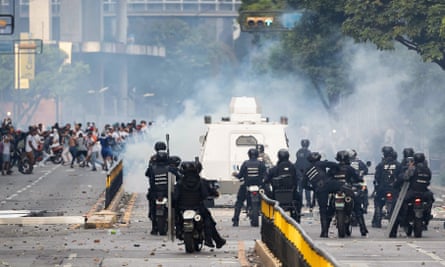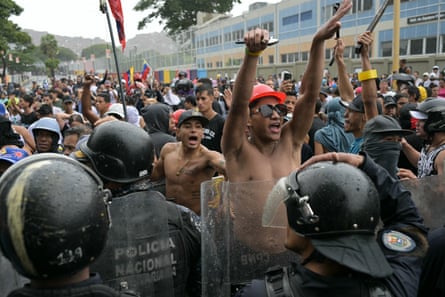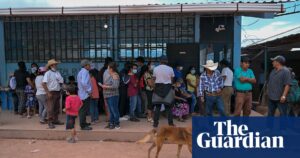The opposition leader battling to bring the curtain down on Nicolás Maduro’s authoritarian regime has urged the Venezuelan strongman to accept that his exit from power is inevitable. The call came as thousands of protesters hit the streets to repudiate Maduro’s disputed claim to have won a third term in power.
Venezuela’s incumbent president was officially proclaimed the victor of Sunday’s election by the government-controlled electoral authority on Monday morning.
Maduro called his supposed victory “irreversible” despite widespread international doubts over the veracity of his claim to have beaten the opposition candidate Edmundo González Urrutia and his campaigning partner, the conservative activist María Corina Machado.
Later on Monday, González and Machado said they could prove their victory after obtaining 73.2% of the voting tallies from polling stations – the official records that show the number of votes cast by the time each polling station closes.
Speaking to the Guardian, Machado urged the president to come to terms with the end of his 11-year rule, during which Venezuela fell into a devastating economic and humanitarian crisis that has forced millions to flee abroad.
“He should understand that he was defeated,” she said of Maduro, who was democratically elected after the 2013 death of his mentor, President Hugo Chávez, but has since taken Venezuela in an increasingly repressive and anti-democratic direction.
Machado rejected Maduro’s earlier claim that his re-election was “irreversible”. “I would say his departure is irreversible,” she said.
Minutes earlier, Machado and González, a former diplomat who ran for the presidency in her place after she was banned, claimed their campaign had hard evidence that González had secured a landslide victory in Sunday’s vote.
Maduro has claimed he beat González, with more than 5.1m votes to his rival’s 4.4m. But Machado, who some call Venezuela’s “iron lady”, insisted her candidate had in fact prevailed, and that the tallies handed to them showed he had won 6.2m votes compared with Maduro’s 2.7m.
“Edmundo González is the president-elect,” she declared to ecstatic cheers from hundreds of supporters who had packed the street outside their hillside campaign headquarters beneath Caracas’s towering El Ávila mountain.
As Machado addressed the throng, thousands of dissenters remained on the streets of Caracas and other cities after a day of demonstrations in which there were several violent clashes with security forces and pro-Maduro paramilitaries.
Remarkably, many of those protesters came from sprawling hillside slums long considered bastions of the Chavismo movement that has governed Venezuela for the past 25 years.
As Rafael Cantillo marched through Caracas alongside hundreds of fellow residents of one such community, he shook with rage. “Maduro stole these elections … it’s a swindle – everyone knows it,” fumed the 45-year-old who hails from a vast working-class enclave called Petare.
Nearby, another community leader from Petare, ️Katiuska Camargo, claimed Maduro had suffered a conclusive defeat in such communities where residents were tired of the deprivation his administration had overseen. “This man did not win. He did not!” she said as the crowd swelled.
As the Petare protesters strode west towards the city centre and the presidential palace, they chanted: “Petare is here. And Edmundo is presidente!”
Throughout the day social media filled with reports of opposition marches originating in poor communities across town and clashes with security forces and pro-Maduro motorbike gangs known as colectivos who were filmed shooting into the air.

“What is happening isn’t just fraud, it is a coup d’état,” said Jesús Herrera, a 37-year-old cook, as he joined one march. Herrera said the people who had taken to the streets were “moved by [Maduro’s] lie”. “It’s such an obvious lie,” he said of the president’s claim to have won re-election when polls had given his rival a major lead. “Everyone thinks the same thing.”
There were also protests in other parts of Venezuela, with at least three statues of Hugo Chávez torn down during the day. Many compared those scenes to the dramatic images of a statue of Saddam Hussein being toppled in downtown Baghdad during the Iraq war. In Portuguesa state, protesters were filmed vandalising a propaganda billboard featuring a photograph of Maduro and a slogan promising “more changes and transformation”.
On Monday night there were also reports that protesters had stormed Maiquetía international airport on the coast just north of Caracas. At least one incoming flight was delayed.
Maduro’s allies, who blame Venezuela’s economic woes on US sanctions, called their own protests for Tuesday afternoon in an attempt to show popular support likely to further inflame tensions on the streets of Caracas.

In a televised address, Maduro claimed groups of “delinquents” had invaded the regional offices of the electoral authority in the city of Coro. The president said such actions were part of “a violent counter-revolution” being waged by criminal and fascist far-right extremists.
“The law must be respected,” Maduro declared, claiming such activities were designed to spark “an escalation of violence” that would ultimately lead to the opposition’s “golden dream – seizing power”.
“The gringos are behind this plan,” Maduro claimed.
The election and its results have been widely questioned within and beyond the region. The US secretary of state, Antony Blinken, said Washington had “serious concerns that the result announced does not reflect the will or the votes of the Venezuelan people”, while the Organization of American States planned to meet in Washington on Wednesday to discuss the issue.
Peru – which is home to more than 1.5 million Venezuelan exiles – has reacted to the “serious and arbitrary decisions” of the Maduro regime by ordering all Venezuelan diplomats to leave the country within the next 72 hours.
But Maduro’s allies in countries such as Cuba, Bolivia and Honduras have welcomed his claim of victory – as has Russia, which urged González and Machado to concede defeat.
“We see that the opposition does not want to accept its defeat. But we believe that the opposition should do this, should congratulate the winner of these elections,” the Kremlin spokesperson, Dmitry Peskov, said on Tuesday.
He added that external forces should not seek to stoke instability in Venezuela, which had become a top Russian ally under Maduro’s government.
“It is very important that these attempts to shake up the situation inside Venezuela are not fuelled by third countries – third parties – and that Venezuela is free from external interference,” Peskov said.
Chinese state media reported that President Xi Jinping also congratulated Maduro on winning Sunday’s vote.
Reuters contributed to this report.
Source: theguardian.com


















